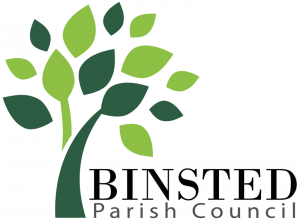Binsted Parish Council is a non-political body which is focused on understanding and representing the views of the community living and working in Binsted Parish community.
Parish councils do have some legal powers and are responsible for managing the land and assets which they own, but much of parish councils’ work involves persuading other authorities (such as East Hants District Council and Hampshire County Council) to carry out work for the parish in activities such as transport, education, housing, planning, environmental health, social services, and policing. It is a legal requirement for the Parish Council to be consulted in Planning matters, and is often also consulted on other wider matters, but is rarely the decision-maker in these.
The Parish Clerk
The Clerk’s overall responsibility, as an employee of the Parish Council, is to carry out the decisions of the Council and to guide it on matters of procedure and law. The Clerk is responsible for seeing that the business of the Council is legal and efficient, with financial transactions properly authorised, recorded and audited. The Clerk also manages the day-to-day running of the council’s sites and provides administrative support to the Council team.
Councillors
Binsted Parish Council consists of eight councillors and a chair. None receives any remuneration or expenses for their work for the Council. Councillors are either formally elected or, in the event that a ‘casual’ vacancy occurs, co-opted by resolution of the Council. Elections are held every four years.
Councillors perform their duties in accordance with the Code of Conduct for Councillors, and with the Council’s policies, rules (‘Standing Orders’) and financial regulations. Councillors disclose, and register with East Hants District Council, their personal interests, and must ensure that none of their council activities conflict with these personal interests. Details of councillors’ declared interests can be provided on request.
At the Parish Council’s Annual General Meeting, a Chair for the coming year is elected and councillors agree which council projects and responsibilities they will undertake, according to their expertise, experience, interests and availability.
The contact details of all councillors area available here. Councillors Details
Meetings
Parish Councils must each year, by law, hold a minimum of an Annual General Meeting of the Parish Council (in May) and three other meetings. In practice, the full Council and Planning Committee meets formally every month; and the Transport Working Group and Finance Committee meet as necessary. Details of forthcoming meetings are posted on the Meetings page and on Parish Council notice boards. More information about the remit and rules governing the Council’s committees and meetings can be found in the BPC Standing Orders 2022 with Appendices 30 July 2022. Council meetings are usually held in the Binsted Sports Pavilion and are open to the public.
Planning
Both East Hants District Council (EHDC) and the South Downs’ National Park (SDNP), as the Local Planning Authorities, consult the Parish Council on all planning applications originating in, or of relevance to, the Parish. This webpage [https://binstedparishcouncil.org.uk/planning-applications] automatically shows details of all planning applications being made in the parish – to either planning authority: you’ll find all the relevant documents, including the deadline for making comments, the status of the application, and a map to see where the property is.
Parish Councils have no statutory powers in the planning process, but planning authorities do take account of parish councils’ local knowledge and their feel for local public opinion when they determine the outcomes of applications. Binsted Parish Council’s Planning Committee discusses all planning applications, and its comments and recommendations are forwarded by the Parish Clerk to the relevant planning authority, for consideration alongside representations from the public and other organisations.
Binsted does not have a Neighbourhood Plan. Such a Plan would have the status of Supplementary Planning Guidance and would be considered as a material consideration when determining individual planning applications.
EHDC also does not have a Local Plan. This is currently in development.
